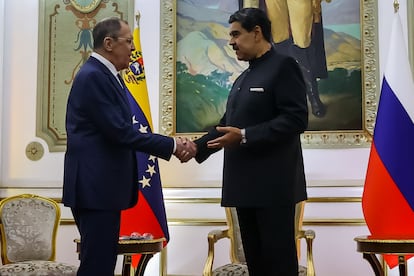Russian foreign minister visits Caracas and reaffirms support of Venezuela’s Maduro
Venezuela’s foreign minister said both countries ‘are victims on the international stage of the illegal, irrational, illegitimate application of unilateral coercive measures,’ referring to economic sanctions

Russian Foreign Minister Sergei Lavrov reaffirmed Tuesday his government’s support for the administration of Venezuelan President Nicolás Maduro, expressing commitment to strategic cooperation in numerous sectors, including technology, energy and culture, during an hours-long visit to the South American country.
Lavrov’s meetings with Vice President Delcy Rodriguez and Foreign Minister Yván Gil in the capital, Caracas, took place as Venezuela’s government and a U.S.-backed faction of the opposition continue to negotiate conditions to level the playing field ahead of this year’s presidential election.
During the difficult negotiation process, which started in 2021 and has been guided by Norwegian diplomats, Russia has completely backed the Venezuelan government.
Unconditional Russian and Chinese support has allowed Venezuela to circumvent crippling economic sanctions, imposed primarily by the U.S.
Lavrov told reporters Russia’s support of Maduro’s representatives in the negotiations “remains in force.” His second visit to Caracas in less than a year, which came after a stop at Cuba, was part of a three-country tour of Latin America. His next and final stop is Brazil, where he will participate in a meeting of the Group of 20 foreign ministers.
Gil said ongoing discussions with Russia include increasing the number of flights between both countries which are operated by Venezuela’s state-owned airline, as well as opening an insulin production plant equipped with Russian technology.
“Venezuela and Russia are two countries that are victims on the international stage of the illegal, irrational, illegitimate application of unilateral coercive measures,” Gil said referring to economic sanctions. However, he said, both countries “have woven a close relationship, a functional, structural relationship that allows us today to show concrete results to our people.”
Sign up for our weekly newsletter to get more English-language news coverage from EL PAÍS USA Edition
Tu suscripción se está usando en otro dispositivo
¿Quieres añadir otro usuario a tu suscripción?
Si continúas leyendo en este dispositivo, no se podrá leer en el otro.
FlechaTu suscripción se está usando en otro dispositivo y solo puedes acceder a EL PAÍS desde un dispositivo a la vez.
Si quieres compartir tu cuenta, cambia tu suscripción a la modalidad Premium, así podrás añadir otro usuario. Cada uno accederá con su propia cuenta de email, lo que os permitirá personalizar vuestra experiencia en EL PAÍS.
¿Tienes una suscripción de empresa? Accede aquí para contratar más cuentas.
En el caso de no saber quién está usando tu cuenta, te recomendamos cambiar tu contraseña aquí.
Si decides continuar compartiendo tu cuenta, este mensaje se mostrará en tu dispositivo y en el de la otra persona que está usando tu cuenta de forma indefinida, afectando a tu experiencia de lectura. Puedes consultar aquí los términos y condiciones de la suscripción digital.








































